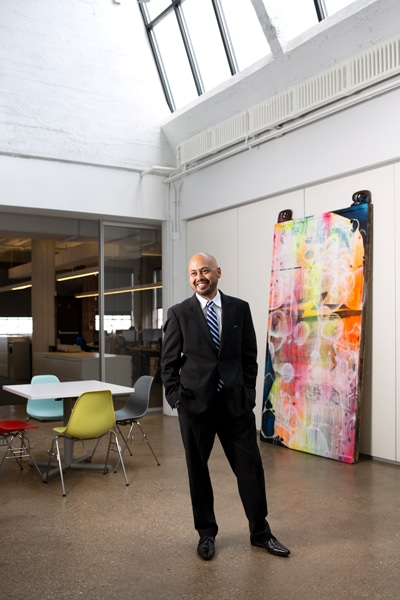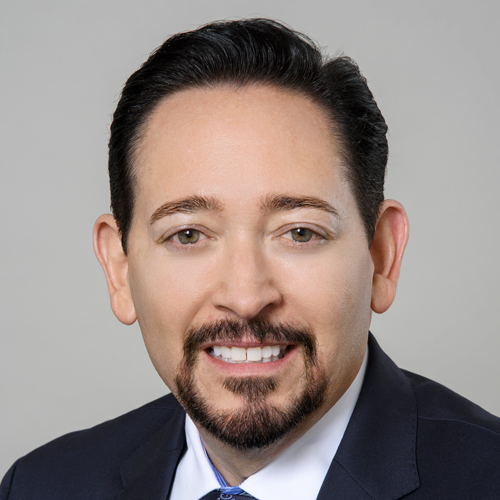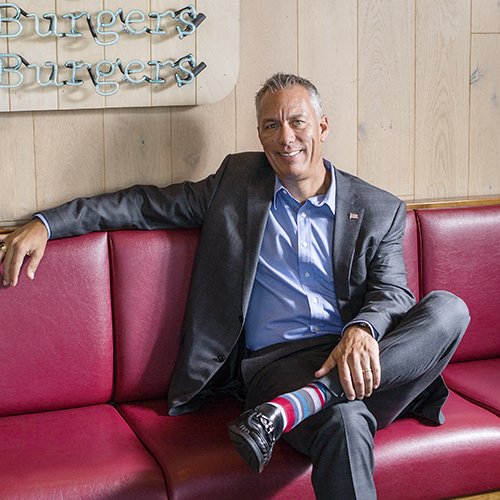|
Getting your Trinity Audio player ready...
|

Beer brands are always competing for the same consumer. The most iconic example of which might be Budweiser and Miller’s decades-long advertising wars. In a market that’s constantly evolving through new innovations and brands, competition has never been more intense.
For Sergio Barrios, senior vice president of government affairs at Mike’s Hard Lemonade and a nineteen-year veteran of the beer industry, he sees his peers in the beer industry as allies and collaborators rather than rivals.
“The government affairs world in the alcohol industry is actually quite small, and our role is to ensure that we can all compete in a fair and equitable marketplace. Due to the amount of legislation that is introduced yearly, it lends itself to working in collaboration with individuals from competing companies,” Barrios says. “The battleground for our industry is on the store shelves and tap handles, and our sales and marketing teams wage that battle daily. My role is unique, though, because we tend to agree with our competitors 90 percent of the time in regards to legislative issues. We work in conjunction with our wholesaler network, our retailers, and national-level associations.”
Barrios, a San Diego native, never imagined that he would end up as a “beer guy.” Being the child of immigrants, Barrios did not realize that this type of work was available. During his last year of graduate school, a friend mentioned that Heineken USA was looking for a merchandiser to stock shelves and fill displays. “At the time, I saw this opportunity as a job and not a career; my goal was to become an FBI agent,” Barrios says. During his time in this role, however, he caught the attention of the vice president of corporate affairs and, at the age of twenty-four, Heineken USA promoted him to public affairs manager, overseeing thirty states for state government affairs. “Everyone needs someone who is willing to take a chance on you, and for me, it was my boss at Heineken,” Barrios says. “He got me young and was able to mold me in the way he wanted and teach me the things necessary to be successful.”
Education was the critical driver that allowed for this opportunity to occur. Barrios earned a bachelor’s in political science and master’s in public administration from San Diego State University. He was later told that, without a master’s, he would never have been given the opportunity, given his age and inexperience. “Being the first generation born in the United States, education was viewed as the great equalizer and was the thing my mother always pushed,” Barrios says. “Education does not guarantee success. What it does do is open doors that were previously not there. Once you get the job, you must continue to prove yourself every day; always stay hungry.”
Laws surrounding alcohol are quite complex with a legacy that dates back to Prohibition. In fact, as Barrios points out, alcohol is one of the few consumer products mentioned in the US Constitution. Essentially, when Congress passed the Twenty-First Amendment in 1933, repealing Prohibition, the federal government returned the right to govern the sale, production, distribution, and consumption of alcohol back to the states. The result was fifty-one, including Washington, DC, different sets of laws surrounding alcohol. It’s a complex and widely varying legal landscape that can change with the passing of any number of various new statutes that move through state governments each year.
Fortunately, Barrios has years of experience in this realm. “I go in with a strong background on alcohol issues, and I will educate on certain laws that were put into place and how potential legislation can impact the industry, consumers, and ourselves,” he says. “A lot of times, legislation is well-intentioned, but sometimes lawmakers don’t understand the consequences of what can occur or the reason the law was initially put in place.”
When looking at his skills, Barrios says the two most important assets for him are being honest and well-prepared. “You have to be able to articulate what the issue is to a legislator and then hopefully come in with a solution,” he says. “You also have to be able to be honest on what the outcomes could be if your solution were to be taken upon and what the opposition will be.”
Since he joined Mike’s Hard Lemonade in 2009, the ability to articulate his company’s perspective on the laws that govern its products has come in handy. One instance from early in his career at Mike’s Hard stands out to him as specifically challenging, yet it led to one of his biggest successes.
In 2009 and 2010, the caffeinated malt beverage Four Loko began causing a public outcry because of a rise of overconsumption. Universities began banning the beverage, and the Illinois attorney general, along with twenty-four other state attorney generals, began investigating the manufacturer for misleading marketing. With all the media surrounding Four Loko, state legislatures began looking at bans on all flavored malt beverages—which would no doubt hurt Mike’s Hard Lemonade—rather than looking at issues surrounding the specific product and manufacturer’s issues, such as the vast quantities of caffeine and high alcohol content in Four Loko.
Mike’s made the conscious decision to not enter this high-alcohol caffeinated market, even after having multiple retailers ask for it. The owner of the company, Anthony Von Mandl, wasn’t comfortable in moving in that direction even if it meant potentially missing out on the next big thing. It turned out to be the right decision. Ensuring legislators understood the difference was key. “Legislators tend to use a cleaver when a scalpel will work,” Barrios says. “If the attorney generals thought we were doing something wrong and could show us how, we would meet with them and we would fix the issue. We were willing to do those things, being a family company.”
So, instead of seeing full bans of flavored malt beverages, the result was a more targeted focus on the problematic players in the category.
Recently, Barrios saw another major victory in the state of Florida when it came to his attention that the Florida definition of beer would not allow Mike’s Hard’s hard seltzer product, White Claw, to be sold in the state. The definition had been drafted after Prohibition when these types of products were not around. Also, the Florida definition was just different enough from the federal definition that it was legal federally, but not in the state. Again, the need to collaborate was evident, and Barrios was able to identify multiple companies that were running into the same issue to work together to provide the context behind the needed change. “In general, most people don’t think about what it took to get a product to market,” Barrios says. “By simply adding a few words to the current regulations, the issue was put to bed.”
The White Claw case is a high point in Barrios’s career, but the product is emblematic of why he enjoys working for Mike’s Hard Lemonade.
“For us, we think that flavor is what helps us get ahead on everything,” he says. “We all have to be experts in one thing, and for our company, it is flavor, I think that’s what has allowed us to grow at the rate we’ve grown.” When people taste the difference between products that we produce and those competing in our category, we see a tremendous amount of shift towards our brands.
In the nearly ten years that Barrios has been with the company, Mike’s Hard Lemonade has doubled its business, and Barrios says the company plans to double that business again in the next five years. Yet, as the company looks to break its own sales records, Mike’s Hard Lemonade remains a family-owned operation, and it still has the same spirit and culture it started out with when it was founded in 1999. The company remains humble, authentic, and driven. This all stems from the owner.
“Every time we have a conversation the first question is, ‘How is your family?’” Barrios says. “That filters all the way down from our executive team to everyone in our organization. If you’ve ever had the pleasure of meeting the owner, you’ll find that he’s incredibly humble, and if someone came into the organization with a chip on their shoulder, they wouldn’t make it at our company. As a first-generation kid, I try to be as humble as I can be.”

